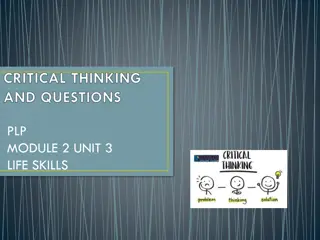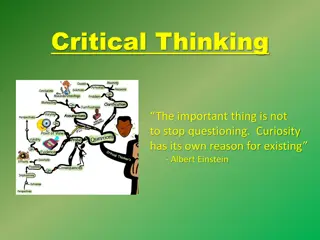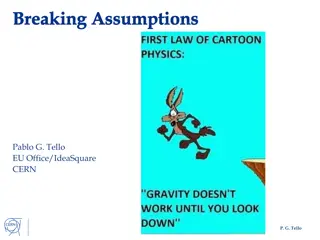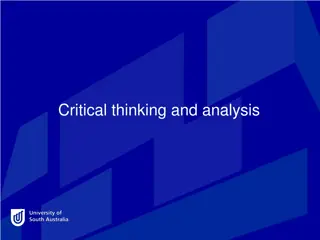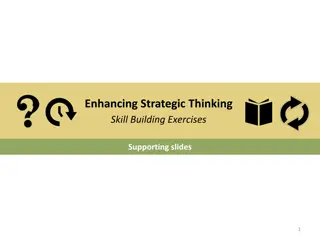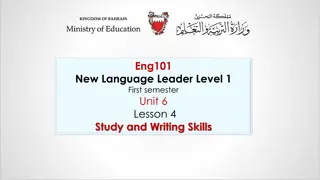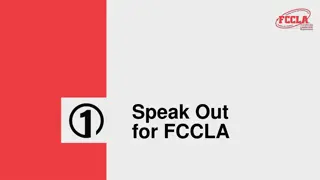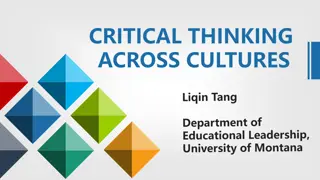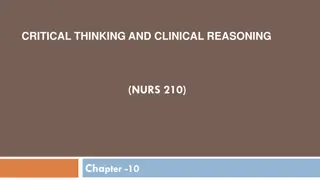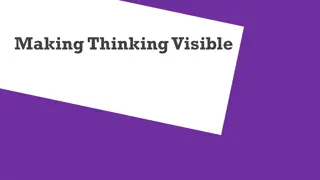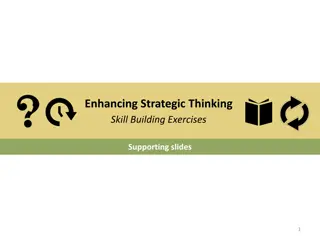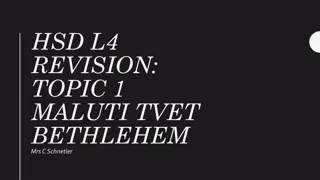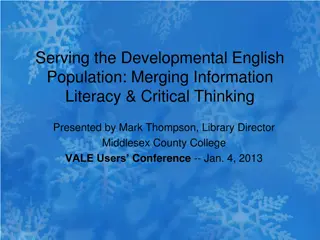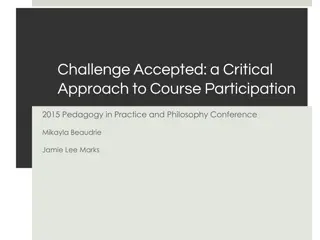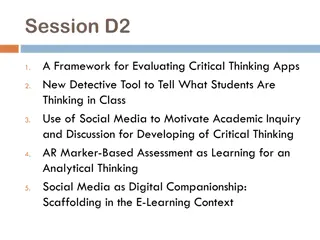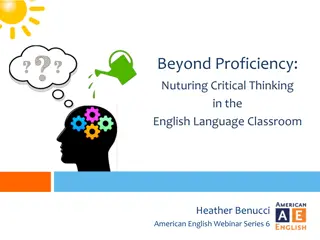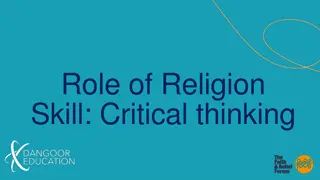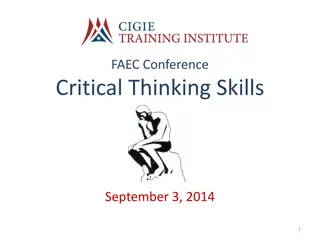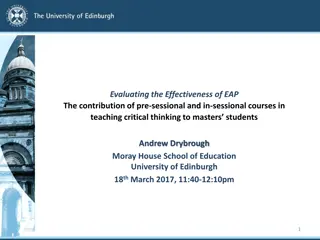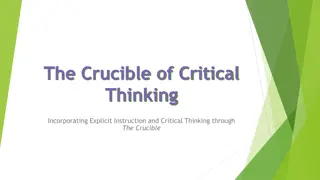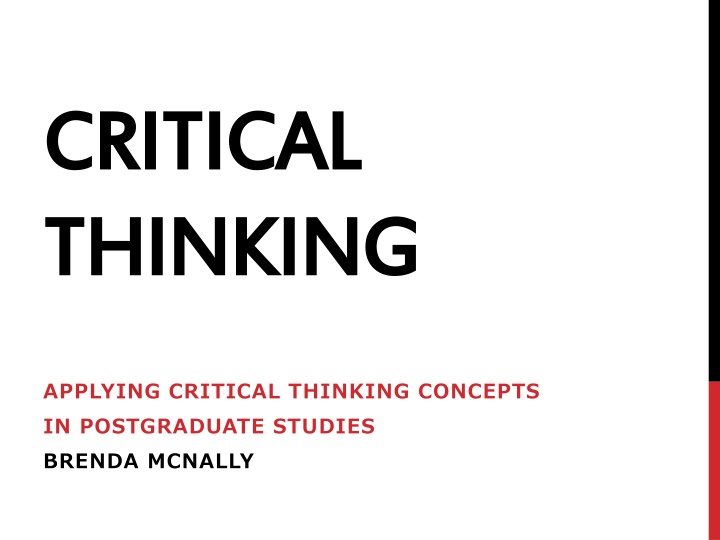
Unlocking the Power of Critical Thinking in Postgraduate Studies
Dive into the world of critical thinking with a workshop led by Brenda McNally. Explore the basics, learn to analyze and evaluate information, and apply critical thinking concepts in academia. Discover the art of weighing up information, asking critical questions, and challenging assumptions to enhance your postgraduate studies experience.
Download Presentation

Please find below an Image/Link to download the presentation.
The content on the website is provided AS IS for your information and personal use only. It may not be sold, licensed, or shared on other websites without obtaining consent from the author. If you encounter any issues during the download, it is possible that the publisher has removed the file from their server.
You are allowed to download the files provided on this website for personal or commercial use, subject to the condition that they are used lawfully. All files are the property of their respective owners.
The content on the website is provided AS IS for your information and personal use only. It may not be sold, licensed, or shared on other websites without obtaining consent from the author.
E N D
Presentation Transcript
CRITICAL CRITICAL THINKING THINKING APPLYING CRITICAL THINKING CONCEPTS IN POSTGRADUATE STUDIES BRENDA MCNALLY
WORKSHOP OVERVIEW WORKSHOP OVERVIEW Ideas about Critical Thinking Critical Thinking: the Basics The Critical Thinking Process Critical Reading & Writing Workshop Exercises Drawing it all together: Q&As
WHY ARE WE HERE? The Unexamined Life is Not The Unexamined Life is Not Worth Living Worth Living Socrates Socrates Thinking with a purpose Reflective Judgement Distinguishing Facts from Opinion
CRITICAL THINKING IN ACADEMIA Shed new light on societal challenges: Create new knowledge evaluate, challenge and change societal structures Highlight and question Accepted views Assumptions Agenda s/Biases
CRITICAL THINKING: THE BASICS (I) The art of analysing and evaluating thinking with a view to improving it **** The principal goal of critical thinking is determining when it is reasonable to accept claims
CRITICAL THINKING: THE BASICS (II) Move from Description to Analysis! Description reproducing information Summarising texts Passive: Accepting details, findings etc Analysis deconstructing information in order to Active: Challenge assumptions; perspectives Show limitations in positions, exceptions to cases Highlight alternative under-examined aspects of issues
THE PROCESS OF CRITICAL THINKING Weighing Up and Considering Information Asking Critical Questions How and Why Evaluate arguments, claims, findings to identify Opinions V Facts Values/World view Assumptions Biases/Agendas Highlight limitations, omissions, misconceptions, faulty logic (misinformation)
CRITICAL READING Aim: Identify evidence to back-up /challenge a view Assess argument validity/importance of text(s) Develop Reflexivity General Strategies: Ask Questions: How..? Why..?
CRITICAL WRITING Descriptive provide facts or information eg summary of an article/report; results of experiment Analytic Descriptive and re-organised into categories, groups, parts, types Persuasive Include your own pov on topic/issue eg interpretation of findings, recommendations/Gen in discussion/conclusion (discuss) Critical facts + reorganised + your pov + others pov (critique; evaluate; debate)
LITERATURE REVIEW Aim: Demonstrate your knowledge of previous work in your field: Identify, Analyse Interpret key themes Situate your research in the context of this work Highlight the gap in the research and Show how your project fills this gap/ contributes to literature
CRITICAL THINKING CHECKLIST What are the issue and conclusion What are the reasons/any flaws in reasoning What are the assumptions Are there rival causes How good is the evidence Which words/phrases are ambiguous Are the statistics deceptive Are there any significant omissions What reasonable conclusions are possible
CRITICAL THINKING SKILLS RECAP: Interpreting: understanding the significance of data and to clarify its meaning Analysing: breaking information down and recombining it in different ways Reasoning: creating an argument through logical steps Evaluating: judging the worth, credibility or strength of accounts.
THANK YOU, THANK YOU, ANY QUESTIONS? ANY QUESTIONS? Brenda McNally Brenda McNally
FURTHER READING Cottrell, S., (2005), Critical Thinking Skills, Palgrave: Basingstoke

